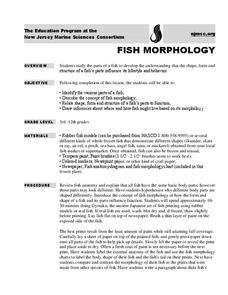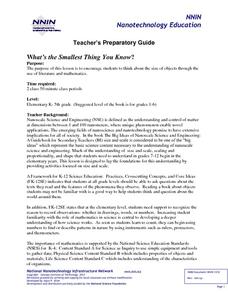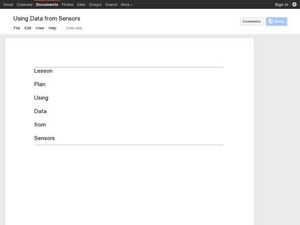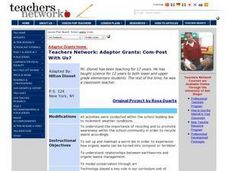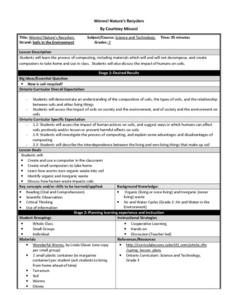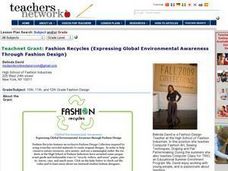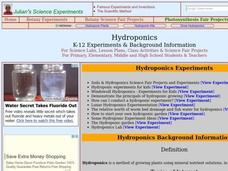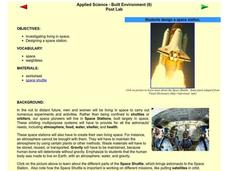Curated OER
Fish Adaptations and Habitats
Students explore specific adaptations and how they pertain to the survival of the individual and the species. Students design a fish based on certain criteria and determine the type of habitat which would be best suited for their fish's...
Virginia Department of Education
Evidence of Evolution
What an impression fossils make! In this activity, aspiring paleontologists view fossils and construct a timeline to further understand how the lack of natural adaptation caused historical organisms to become extinct. While they...
Curated OER
A Fishy Twist on Adaptations
Young scholars examine the relationship between specific fish adaptations and their function for survival. They design a fish based on certain adaptations and then decide to which habitat their fish would be best suited. Individual...
Consortium for Ocean Science Exploration and Engagement (COSEE)
Fish Morphology
Life comes in all different shapes and sizes, and fish are no exception. Here, young scientists create fish prints as they learn how specific characteristics allow different species to survive in their particular habitats.
Curated OER
Three R's to Environmental Stewardship: Earth Day
Students explore the ways to conserve our natural resources. In this recycling, reusing, and reducing lesson students read Dinosaurs to the Rescue and apply their findings to learning ways to conserve resources. Students complete a...
Environmental Protection Agency (EPA)
Happy Earth Day Coloring Book
From turning off lights when leaving a room, to biking or walking to school, there are many simple habits children can develop to help preserve the earth. Help raise environmental awareness in your class with this activity packet that...
Baylor College
What Is the Water Cycle?
Small groups place sand and ice in a covered box, place the box in the sunlight, then observe as evaporation, condensation, and precipitation occur. These models serve as miniature water cycles and demonstrations of the three phases of...
National Nanotechnology Infrastructure Network
What’s the Smallest Thing You Know?
Elementary learners listen to a story, then sort objects from largest to smallest at six different stations around the classroom. Adaptable for a large range of age and ability groups.
Curated OER
Recycle! Recycle! Recycle!
Students investigate recycling and reusing. They view an online video, create an recycled art collage using picture files in Inspiration software, and write a choral poem about recycling.
Curated OER
Using Data from Sensors
Beginning with a discussion about using technology to collect data, this resource includes a video about the next Mars rover as an example. Young scientists are taught that filtering is necessary before collected data can be analyzed....
WK Kellogg Biological Station
Sounds of Selection
Do you want a creative and fun way to teach about natural selection? Hop to it by turning your middle school princes and princesses into frogs trying to catch as many bugs as possible in a Hungry Hungry Hippos style game. For high...
Curated OER
We're Environmentally Friendly
Fourth graders examine written works dealing with environmental issues and resolutions during a 5 week unit. They create posters, poems, and rap songs demonstrating authorship and knowledge of the environment.
Texas State Energy Conservation Office
Investigation: Waves and Whistles
Wave goodbye to the same old demonstrations for alternative energy sources, and wave hello to this one investigating ocean waves! Using a water bottle to create an oscillating water column, learners see and possibly hear how the...
Curated OER
Com-Post With Us?
Students discuss the importance of reducing, recycling and reusing materials to help the environment. As a class, they create a worm bin and observe how it turns material in to compost. They use the internet to research the...
Curated OER
Worms, Nature's Recyclers!
Learners study what worms need to survive in different environments. They study how worm composting improves soil and reduce waste. They discuss composting techniques and present a puppet show about a worm's life.
Curated OER
Fashion Recycles
Complete fashion design activities as a part of a study on protecting the environment. In this fashion and environment lesson, students discuss global environmental awareness and work in groups to list recyclable products that can be...
Curated OER
How Much Water?
Learners investigate amount of water available in different countries around the world, compare it to their daily water use, and explore how unequal distribution of water can cause challenges to survival. Students then discuss need to...
Curated OER
Hydroponics
Students examine how to grow plants using a hydroponic system. For this hydroponics lesson students identify the advantages and disadvantages of growing plants hydrologically.
Curated OER
The Recycle Games
Students play a series of Recycle Games which provide great exercise while teaching about the importance of recycling. They participate in relay races and games that make use of recycled materials and other "trash."
Curated OER
Design a Space Station
Sixth graders investigate living in space. In this science lesson, 6th graders discuss what it is like to live in space and create their own space station or space city of the future.
Curated OER
My Favorite Meal
Students investigate ecological systems and the multiple uses of the environment by studying the osprey population.
Curated OER
To Renew, or Not to Renew
Students explore the various types of renewable energy. After reading articles, they discover the advantages and disadvantages of renewable energy. They also explore the challenges to switch over to using more and more renewable energy...
Curated OER
Solid Waste/Recycling
Learners see that when we throw away garbage, it usually ends up in a landfill. Landfill space is getting increasingly scarce, and every time we throw something away we throw with it the energy, the money, and the raw materials it took...
Curated OER
Soild Waste and Recycling
In this unit of lessons, students examine solid waste and recycling. They discover the concept of decomposition. They also observe the decomposition process and make observatins.



